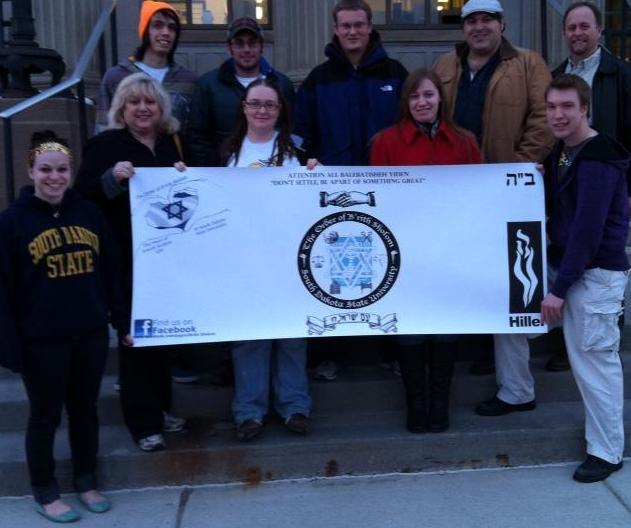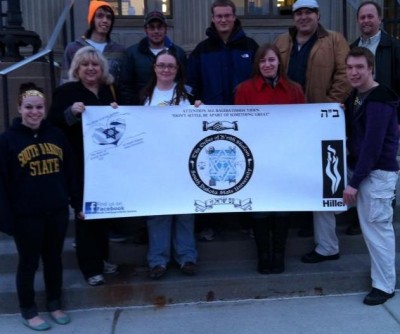
South Dakota State University’s B’rth Sholom is more than just the only Jewish cultural club in the state. Its nine members constitute one of America’s most diverse Jewish organizations, as about half them identify as Messianic Jews, or those with Jewish practice who accept Jesus as the Messiah.
“We really don’t try to segregate by background,” said Rachel Hunt, the club’s co-founder and current vice president, who grew up Reform in Minneapolis-St. Paul, Minn. “We just try to appreciate the fact that we all identify as Jews.”
This is a large statement, as Messianic Jews have historically been excluded from nearly every Jewish denomination and institution, even the most inclusive. Since the Law of Return did not recognize Jews who had converted to another religion, Messianic Jews were not even eligible to move to Israel under Israeli law. The Supreme Court changed that in 2008 when it allowed the law to apply to those who can claim Jewish ancestry on their fathers’ side (and are thus not Jewish according to Jewish law).
Yet B’rith Sholom remains unfazed. Due to the small Jewish population of South Dakota State, “if someone shows interest in the group, Jewish or not, we are going to be welcoming,” Hunt said.
The club began when Tim Hanna, a self-described “traditionalist” Jew, came to South Dakota State in 2010 following 11 years of active service in the Marines and Navy in pursuit of a master’s degree in communication studies and “a little space.”
Though Hanna soon came to appreciate the “DIY attitude” observant life in Brookings, South Dakota requires, he still missed the communal aspects of Jewish life.
By the summer of 2012, he began asking friends if they knew any other Jews at SDSU. He eventually sent a Facebook message to Hunt asking if she wanted to start a Jewish club on campus.
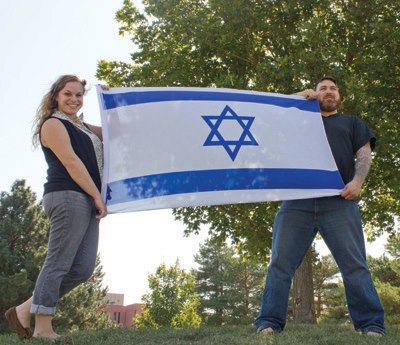
She agreed. They met in person, borrowed a name in tribute to The International Order of B’rith Sholom (a Philadelphia-based Jewish fraternity founded at the turn of the 20th century) and named Hanna the club’s first president.
For the first few months, South Dakota’s only Jewish club was just the two of them. An article in the campus newspaper, The Collegian, spread awareness, and they were eventually able to fulfill the officer/membership requirements of seven affiliated members to become an official student organization on campus. They also affiliated with Hillel International, who added a link to B’rith Sholom on its Web site.
Shortly after B’rith Sholom formed, Messianic Jews began expressing interest. According to Hanna, the club’s original rules stipulated that only Jews could hold leadership (voting) positions, but anyone interested in Jewish culture could join. In response, they added a stipulation that any attempts at proselytization would result in immediate expulsion from the club, a rule Hanna supported following his negative experiences with proselytizing Messianics in New York City.
“I hoped that the membership policy would keep the club in Jewish hands while embracing these cross-cultural exchanges,” he said.
The club functioned its first year with two Messianic Jews deeply involved in the club’s activities. Their hard work earned Hanna’s and Hunt’s trust enough for them to agree to allow them to hold what Hanna called “temporary, minor officer positions.”
One of these Messianic Jews was South Dakota native Andy Engelmann, a part-time entrepreneurial studies major set to graduate some time in 2018. Engelmann’s path to Messianic Jewish belief has been a winding one. Shortly after coming to the U.S. in the 1930s, his mother’s Jewish family converted to Christianity following his great-uncle’s marriage to a Catholic woman. His family followed this faith strictly and even homeschooled him and his siblings. Everything changed, however, in 2001 when a family friend brought over a tape promoting Hebrew Roots, a movement meant to return Christians to the faith of Jesus. This eventually led to the family adopting more and more Jewish practice, even as it led to the rest of his family gradually stepping away from them.
While he believes he has been treated better by Jews than most other Messianics have because he is ethnically Jewish, he said his Messianism has nonetheless made him a pariah of two communities:
“We keep Torah, so the Christians call us Jews. We believe the Messiah has come, so the Jews call us Christians. Individually though, I’ve learned to speak both languages, I discuss the holidays and such around my Jewish friends and focus more on the Messiah when talking with my Christian friends. I like to say we are the bi-polar red-headed stepchild of both of these groups.”
The other Messianic Jew was Marcella Rose Steinmeyer, a sophomore majoring in hospitality and hotel management as well as German. She grew up in a Messianic Jewish family in Hebron, Neb., where the nearest Jewish community was over an hour and a half away. Her experiences at SDSU provided her first taste of organized Jewish life.
“I know my friends find me a contradiction being both a Jew and a Christian,” she said. “Many people here at SD State are just surprised to discover that there are Jews in South Dakota.”
Engelmann estimates that of the approximately 150 Jews in South Dakota, 50 are Messianic. For most South Dakotans, meeting a Jew of any kind is a novelty, and this has given club members something else to bond over. Steinmeyer said that most people she interacts with have a “TV idea” of Jews. She further said they often expect her to have the Bible memorized or to be fluent in Hebrew, though she feels the most difficult thing is explaining that Jewish holidays are not related to Christian ones.
Though they all have experienced stereotyping, everyone in the club is emphatic that they have never experienced anti-Semitism.
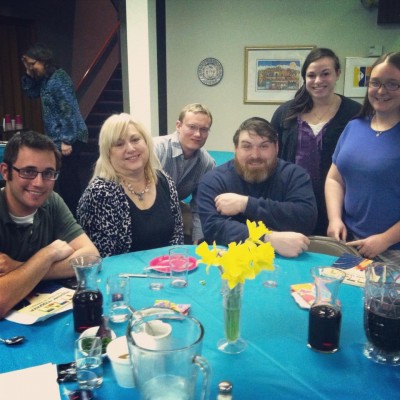
“As soon as they get over the shock and joy of discovering a Jew, [it’s] a little like getting over the shock/joy of finding buried treasure in one’s own backyard,” Steinmeyer said.
United by its members’ shared strong sense of Jewish pride, B’rith Sholom held itself together without difficulty until two of the club’s Jewish members graduated in May 2013.
While in New York that summer, Hanna learned that one of the Messianic members of the club allowed a traveling Chabad emissary to wrap tefillin on him as a Jewish man. This act offended Hanna’s sensibilities enough that, upon returning to South Dakota, he had what he described as “frank conversations with some of the Messianics about the inappropriateness of claiming to be Jewish.”
He went on to suggest that, to best express their beliefs, the Messianics should form their own club with which B’rith Sholom would maintain friendly relations for the mutual benefit of both groups.
His suggestions went nowhere.
His discomfort grew worse at the start of the fall semester, when another Messianic joined, bringing the club’s membership to three Messianics and two traditional Jews.
Hanna went to Hunt to discuss his misgivings.
“I did understand where he was coming from, having two-thirds Messianic Jews on the board of the Jewish Hillel is controversial,” she said.
But she disagreed about the ramifications this should have, telling him that with such a small Jewish population to work with, they should continue focusing on the fact that they all identify as Jews.
By this point, Hanna was also splitting his time between SDSU and the University of South Dakota studying, teaching, and researching towards a doctorate in social psychology and behavioral neuroscience, as well as preparing to get married. The constraints on his time along with his dismay at the new direction taken by the club he founded caused him to officially leave B’rith Sholom at the beginning of this school year.
Also at this time, he emailed Hillel headquarters in Washington, D.C. to voice his concerns about the club’s demographics. He never received a response. A Hillel spokesperson told New Voices that the organization has no policy on Messianic Jewish participation at its branches and no statement on this issue. An Open Hillel representative also said her organization has no opinion on this matter.
After Hanna left, the remaining members amended the constitution to allow all Jews, regardless of background, to serve as members.
“This is just one step to tikkun olam, repairing the world, and I believe that being welcoming to all is one way we can carry out this belief,” Hunt said.
According to Englemann, who now serves as club president, B’rith Sholom has built itself “around the concept of educating SDSU about the Jewish culture. As such, all are welcome to join the club. We are evenly split between Jews, Messianics, and those who are there to learn about us.”
The club’s activities center around creating Jewish experiences. They have visited a synagogue an hour away in Sioux Falls and have come together to celebrate common holidays such as Hanukkah, Purim and Passover, as well as the occasional Shabbat meal. They receive very little outside funding and members pay for most programming out-of-pocket.
“We feel a sense of belonging and familiarity when we celebrate together,” Hunt said.
Steps are constantly taken to avoid any controversy or discomfort among members. According to Hunt, the group rarely prays together because that’s where differences would be most manifest.
Steinmeyer, now club secretary and treasurer, said any disagreements are discussed and resolved in a calm, civil manner and usually end with increased understanding on both sides.
“We all understand that we don’t want arguments about philosophy, because we are one people. … However different our personal philosophies are from one another, the idea and knowledge that we are ALL Children of the Most High Gd makes the differing philosophies irrelevant,” she said [emphasis in the original].
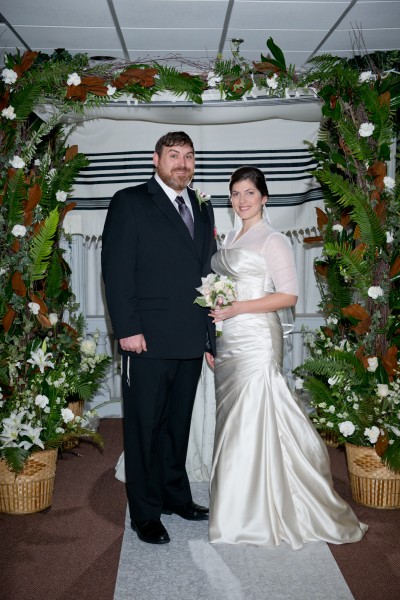
Hanna and current club members report only mutual respect and no hard feelings. Hanna and his wife now live about an hour south of Brookings, and they hope to someday open their home to the Jewish community on Shabbat and holidays.
“The current members of B’rith Sholom are by my estimation good people … and I wish them the best. Hopefully there will one day be a sizable Jewish student body at SDSU, and the dream of a Jewish student organization will be revisited,” he said.
Engelmann has big plans for B’rith Sholom’s future. In an interview with The Collegian, he said he hopes the club can be the inspiration for others at campuses around the state, saying, “It would be nice to have a sister chapter to bounce ideas off and build unity… we are a lone wolf.”
He believes the wider Jewish world has something valuable to learn from B’rith Sholom’s example.
“We are a people scattered to the nations. … We are different both from everyone around, as well as each other. But our differences are [not] a weakness, they give us strength. … We are the oldest existing culture on the planet. History has shown over and over that division leads to failure and downfalls. Only through unity will we continue to grow and thrive. Our club is an example of how that unity can lead to great things. Unity through diversity is our future.”
.
Derek M. Kwait graduated from the University of Pittsburgh and is editor in chief of New Voices.
